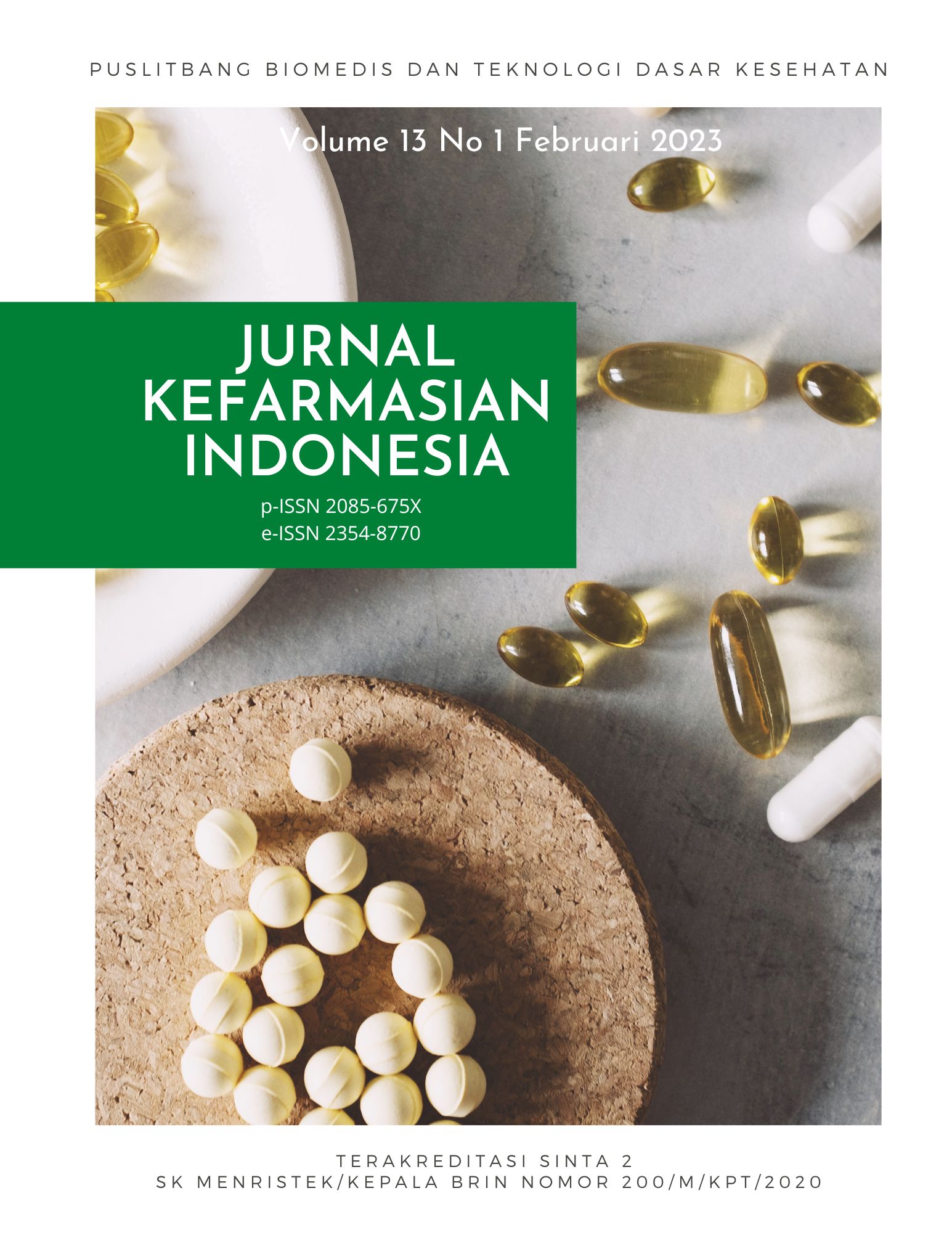Evaluasi Penggunaan Ramipril dan Candesartan pada Pasien Rawat Inap COVID-19 dengan Komorbid Hipertensi di RSUD Dr. Moewardi
Abstract
Hypertension is the most common comorbid in patients infected by COVID-19. Drugs often given for the treatment of hypertension, namely ramipril, and candesartan, are thought to increase the development of COVID-19 because the angiotensin-converting enzyme inhibitors (ACEI) and angiotensin receptor blockers (ARBs) increase the expression of ACE-2, which is the binding site of SARS-CoV-2. This study aims to analyze the effect of using ramipril and candesartan on healing in hospitalized patients with COVID-19 with hypertension at RSUD dr. Moewardi in 2020. This study was conducted retrospectively. The results were presented descriptively and used medical record data of hospitalized patients with COVID-19 with comorbid hypertension at RSUD dr. Moewardi in 2020. Using ramipril and candesartan affects patient recovery in terms of length of stay (LOS), symptom relief, and RT-PCR test results. Analysis of the research data using SPSS with Spearman correlation test. The Spearman correlation test showed that there was a fairly strong relationship between the use of ramipril and candesartan in patients with COVID-19 with comorbid hypertension on LOS, symptom relief, and RT-PCR test results. The study results show that using ramipril and candesartan can improve the recovery of patients with COVID-19 with comorbid hypertension. ACEI and ARB drugs have not been proven to worsen the patient's condition so their use can be continued.References
Gugus Tugas COVID-19. Peta sebaran gugus tugas percepatan penanganan COVID-19 [Internet]. 2020 [disitasi 5 Jun 21]. Diperoleh dari :https://covid19.go.id/
peta-sebaran
Linelejan B, Umboh O, Wantania FE. Pengaruh penggunaan angiotensin converting enzyme inhibitor (ACEI) dan angiotensin receptor blocker (ARB) pada pasien coronavirus disease 2019 (covid-19) dengan hipertensi. e-CliniC. 2021;9(1):104-9.
Guan W, Zheng-yi Ni, Yu Hu, Liang W, Ou C, He J. Clinical characteristics of Coronavirus Disease 2019 in China. N Engl J Med. 2020;382:1708–20. doi: 10.1056/NEJMoa2002032
Wang, Qiang W, Ke Hu. A handbook of 2019-nCoV pneumonia control and prevention. Hubei Science and Technology Press. China. 2020;33-40
Zhang JJ, Dong X, Cao YY, Yuan YD, Yang YB, Yan YQ, Akdis CA, Gao YD. Clinical characteristics of 140 patients infected with SARS- CoV-2 in Wuhan , China. Europian Journal of Allergy and Clinical Immunology. 2020 Jul;75(7): 1730-41.doi: 0.1111/all.1423
Bwire GM. Coronavirus: Why men are more vulnerable to Covid-19 than women?. SN Compr Clin Med. 2020; 2(7): 874–876. doi:10.1007/s42399-020-00341-w
WHO. Clinical management of severe acute respiratory infection when novel coronavirus (2019-nCoV) infection is suspected. interim guidance [Internet]. 2020 [disitasi 10 Jun 21]. Diperoleh dari:https://www.who.int/publications/i/item/WHO-2019-nCoV-clinical-2021-1
Kemenkes RI. Cara efektif cegah penularan COVID-19 : Pemeriksaan, pelacakan, karantina, dan isolasi. Kementrian Kesehatan RI [Internet]. 2021 [disitasi 5 Jun 21]. Diperoleh dari : https://sehatnegeriku.kemkes.go.id/
Wang, Zhao X, Wei W, Fan W, Gao K, He S, Zhuang X. Angiotensin-converting enzyme inhibitors (ACEI) or angiotensin receptor blockers (ARBs) may be safe for COVID-19 patients. BMC Infect Dis. 2021;21(1):1-8. doi: 10.1186/s12879-021-05821-5
Yan F, Huang F, Xu J. Antihypertensive drugs are associated with reduced fatal outcomes and improved clinical characteristics in elderly COVID-19 patients. Cell Discovery 2020;6(1):77. doi : 10.1038/s41421-020-00221-6
Burhan E, Dwi Susanto A, Isbaniah F, Aman Nasution S, Ginanjar E, Wicaksono Pitoyo C, et al. Pedoman tatalaksana COVID-19. Jakarta; 2020
Suryantoro SD, Thaha M, Hayati MR, Yusuf M, Pikir BS, Susilo H. Correlation between anti-hypertensive drugs and disease progression among moderate, severe, and critically ill COVID-19 patients in the second referral hospital in Surabaya: A retrospective cohort study. F1000Research. 2021:1-20. doi: 10.12688/f1000research.51785.2
Azwar MK, Setiati S, Rizka A, Fitriana I, Saldi SRF, Safitri ED. Clinical profile of elderly patients with COVID-19 hospitalised in Indonesia's National General Hospital. Acta Med Indones. 2020; 52(3): 199-205. PMID: 33020331
Fajgenbaum DC, June CH. Cytokine storm. N Engl J Med. 2020; 383(23): 2255-2273.doi: 10.1056/NEJMra2026131
Lam KW, Chow KW, Vo J, Hou W, Li H, Richman PS, et al. Continued in-hospital Angiotensin-Converting Enzyme Inhibitor and Angiotensin II Receptor Blocker use in hypertensive COVID-19 patients is associated with positive clinical outcome. J Infect Dis. 2020; 222(8): 1256-1264. doi: 10.1093/infdis/jiaa447
Semenzato L, Botton J, Drouin J, Baricault B, Vabre C, Cuenot F, et al. Antihypertensive drugs and COVID-19 risk : A cohort study of 2 million hypertensive patients. American Heart Association Journal. 2021; 77: 833–842.
doi:10.1161/HYPERTENSIONAHA.120.16314
World Health Organization. Pertanyaan dan Jawaban Terkait Coronavirus [Iinternet]. 2020. [disitasi 5 Jun 21]. Diperoleh dari : https://www.who.int/indonesia/news/novel-coronavirus/qa/qa-for-public
European Society of Cardiology. ESC guidance for the diagnosis and management of cardiovascular disease during the COVID-19 pandemic: part 2—care pathways, treatment, and follow-up. European Heart Journal. 2021; 00: 1–45. doi: 10.1093/eurheartj/ehab697Huang C, Wang Y, Li X, Ren L, Zhao J, Hu Y, et al. Clinical features of patients infected with 2019 novel coronavirus in Wuhan, China. The Lancet. 2020; 395(10223) :497-506 doi: 10.1016/S0140-6736(20)30183-5
Giacomelli A, Pezzati L, Conti F, Bernacchia D, Siano M, Oreni L, et al. Self-reported Olfactory and Taste Disorders in Patients With Severe Acute Respiratory Coronavirus 2 Infection: A Cross-sectional Study. Clin Infect Dis. 2020;71(15):889-90. doi: 10.1093/cid/ ciaa330
Kreutz R, Algharably EAE, Azizi M, Dobrowolski P, Guzik T, Januszewicz A, et al. Hypertension, the renin-angiotensin system, and the risk of lower respiratory tract infections and lung injury: implications for COVID-19. Cardiovasc Res. 2020;116(10):1688-99. doi: 10.1093/cvr/cvaa097
Schiffrin EL, Flack JM, Ito S, Muntner P, Webb RC. Hypertension and COVID-19. Am J Hypertens. 2020;33(5):373-74. doi: 10.1093/ajh/hpaa057
Zhou Y, Yang Q, Chi J, Dong B, Lv W, Shen L, Wang Y. Comorbidities and the risk of severe or fatal outcomes associated with coronavirus disease 2019: A systematic review and meta-analysis. Int J Infect Dis. 2020;99:47-56. doi: 10.1016/j.ijid.2020.07.029
Copyright (c) 2023 Jurnal Kefarmasian Indonesia

This work is licensed under a Creative Commons Attribution-NonCommercial-ShareAlike 4.0 International License.














